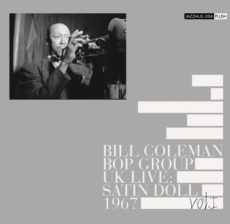
Daily Dose Of Jazz…
Alan Littlejohn was born Albert John Alan Littlejohns on January 4, 1928 in Highgate, London, England. Taking up the trumpet in 1946, he trained as an accountant after the War but also played semi-professionally with bands such as the Blue Note Swingtet and the Galleon Jazz Band. In 1952 he joined Cy Laurie and then a year later moved to play with Eric Silk. Moving to Manchester for eight months he worked with Ron Simpson and the Saints Jazz band in 1954, but then returned to London to work with Eric Silk again.
1955 saw Littlejohn taking a residency at the Putney Jazz Club and a further residency in Chelsea in 1960. In 1963 he led a quintet with trombonist Tony Milliner, pianist Mat Mathewson, bassist Bucky Cowman and Terry Cox on drums, emulating the style of the Bob Brookmeyer/Clark Terry band. Cox and Cowman were soon replaced by Max Cutlan and Dave Holland, respectively.
Over the course of his career Alan would play with Mal Cutlan, Lew Hooper, Jimmy Hamilton, Matt Methewson, Cat Anderson, Peanuts Hucko, Earl Warren, Sonny Dee, the Georgia Jazz Band and to be the support band for Dave Brubeck at his Festival Hall gig. From 1973 to 1978, he played with Alvin Roy’s Band which had a residency at The Prospect of Whitby in London.
When not in residency at clubs in London Littlejohn toured Spain and Germany, guest appeared with the Merseysippi Jazz Band and during the Eighties played as a full-time professional musician for a short period. From 1990 he worked with Laurie Chescoe’s Good Time Jazz until a month before his death. Trumpeter, flugelhornist and bandleader Alan Littlejohn, most notable for his work with artists such as Ben Webster, Earl Hines, Billy Butterfield and recording with Bill Coleman, passed away on November 12, 1995 in Barnet in Hertfordshire.
![]()
#preserving genius
More Posts: flugelhorn,trumpet
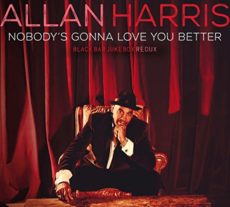
Review: Allan Harris | Nobody’s Gonna Love You Better
Choice, style and interpretation are the cornerstones of this vocalist who has an innate ability to proffer songs that allow him to eloquently emote. Having followed his career over the years there has been little he has been unable to do. Bringing four songs to the session that he penned, Allan deftly selected seven additional tunes composed by music’s elite that crosses all genres. Coupled with this, is his choice of musicians who pull off this roundhouse of songs that will definitely knock your socks off, if not off your feet. After numerous listening sessions and dancing around myself, I warn you now and it is my suggestion that you prepare to move about unabashedly through a variety of tempos. What is truly amazing is that Harris pulls this off without the use of any brass or wind instruments, producing not the sound but the feel of a Sixties rock and roll rhythm section.
This latest offering, Nobody’s Gonna Love You Better is evidence of that fact. An accomplished composer and lyricist, Allan kicks off this compendium of music with the uptempo wisdom of Mother’s Love, the formal name of the title track. Ever the griot, Harris plants thoughts worthy of rumination without being preachy but more of a gentle reminder for every son. He returns with Steely Dan’s brotherly advice by telling us Any Major Dude Will Tell You, giving the listener another lesson in keeping it real.
Covering a hit song is always a tribute to the original artist and requires it be performed just as well if not better. If you were around in 1969 then you remember a quintet called the Spiral Staircase who made More Today Than Yesterday popular for a couple of generations coming of age. Putting the right amount of swing in the mix he stays in the pocket with a big scoop of organ that will have you patting you foot and snapping your fingers, if not dancing around the house.
Giving us the opportunity to breathe a little lighter he drops down to ballad tempo to deliver a heartfelt rendition of the Johnny Mercer/Victor Schertzinger tune I Remember You. Love lost is not love forgotten and Mercer penned this song to Judy Garland, reminiscing over their short-lived romance when she was just 19. For those who may ask has Harris gone through this heartache himself given his superb delivery or like the bass keeping the heartbeat alive, does he just understand the emotional distress in the words, as does pianist Pascal Le Boeuf, who mirrors the sentiment throughout. Be comforted that he is just that good.
Rising up from the samba of Bahia, the bossa nova craze of Rio took the world by storm when the movie Orfeu Negro (Black Orpheus) hit the silver screen. Out of that explosion was birthed a host of composers, musicians and singers that included Dorival Caymmi and Antonio de Almeida who wrote Doralice. Fluently beautiful in the Portuguese language, Allan transports easily us to the side of her lover who is in strife because he loves her so but wants no wife, so he asks her what are they to do. For Brazil and bossa nova, it is nearly always about love. The rhythm is deceptive in its lightness for these star-crossed lovers.
Time has no meaning when one searches for the right song to add to their playlist and the Fields/McHugh tune I’m In The Mood For Love fit the bill perfectly. It was, however, refreshed with an improvised solo on the 1935 melody by James Moody and the lyrics by Eddie Jefferson, we add to the Great American Songbook the tune Moody’s Mood For Love. Harris stays away from the original rendition of performing the woman’s response in a high voice, delivering his version in ballad and taking the woman’s response to a mid-tempo beat and finishing his final words with brashness befitting someone who is smitten and confident and laying his emotions on the table.
Swing says it all in the title and having penned this one himself, Allan celebrate the big band era when teenagers and young adults all over America filled ballrooms like the Savoy, Palomar and Trianon and danced to jazz by Ellington, Goodman and Basie. A fitting tribute to the country’s most popular music between the Depression and a World War.
Hollywood is not off limits for this purveyor of song as he takes the theme song composed by Heinz Roemheld for the film Ruby Gentry. The lyrics by Mitchell Parish were added long after the tune had received wide acclaim. With a tempo suitable for dancing cheek to cheek, Harris speaks to the heart of the Ruby lyric and exposes the anguish, love and futility for this beauty that only the unloved would know. One will notice the bass line quietly captures the mood, with guitars in tow.
Your toes will tap once more as you are introduced to a swinging version of Jimi Hendrix’s Up From The Skies. This exemplifies Harris’ true talent in taking a rock song and giving it new life in jazz. The arrangement features the Hammond B3 gives it the punch need to get you on the floor or at the very least bopping in your seats and leaving you exhausted.
Blue Was Angry comes from the musical Cross That River that he wrote about the Black contributions, trials and accomplishments in the expansion of the West. Closing out this concert with a final ballad that he penned Secret Moments, he leaves us with a bit more wisdom about love and life.
I would be remiss if I didn’t pay my respects to the band that put in the hours to make this a winning project. Joining Allan Harris on Vocals, Acoustic Guitar, Resonator Guitar, D’Angelico Electric Guitar are Russell Hall – Acoustic Bass, Electric Bass; Pascal Le Boeuf – Piano, Fender Rhodes, Hammond B3; Shirazette Tinnin – Drums, Cajon; and Freddie Bryant playing Electric Guitar and Classical Guitar. Listening to them perform I can only surmise they truly had fun putting this one in the can and look forward to hearing them live. You chose well Mr. Harris.
What caught my eye at first glance were the classic songs that were chosen and the order in which they were placed. Introducing new songs, especially those you pen yourself, can often be a difficult task, but he does it well mixing them into the lineup. Next my ear was put to task to stay with a song to see developmental possibilities. As a deejay, I look for order and I will give any artist one opportunity to delight me. The song order in which Harris chose to present was pleasantly received having no inclination to skip a song or change the order. I was taken through all the emotions these composers and lyricists put into their compositions and felt buoyant and fully entertained. I heard versions of classics that were unexpected but fresh in their arrangements. If this is his brand, and I believe it is, he is not to be typecasted but embraced for the pioneering spirit that pushes his envelope to include all genres in this tapestry we call jazz.
For in this disposable world of short attention spans, where music is in your pocket, sold by the track, a click away from changing a song and one cannot listen longer than thirty seconds, there is no more getting up or walking across the room to the turntable, lifting the needle, moving to the next song or having to flip to the B side. I recognize the amount of thought that went into the order of his lineup and hopefully you will also. It may be a rollercoaster ride of emotions that begins on the downhill side of the first climb, winds around all the emotional twists and turns the music offers as it flows smoothly to a halt and we see just what has influenced his life and made him the superior musician and vocalist who has carved out his own niche in this world.
carl anthony | notorious jazz | january 3, 2017
Give A Gift Of Jazz ~ Share ![]()
#preserving genius
More Posts: bandleader,guitar,history,instrumental,jazz,music,review,vocal
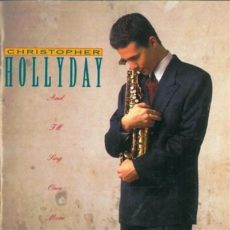
Daily Dose Of Jazz…
Christopher Hollyday January 3, 1970 in New Haven, Connecticut. He started playing alto when he was nine, developed quickly, and was playing in clubs by the time he was 14 years old. That same year he recorded his first album on his own Jazzbeat label. During his childhood years he was heavily influenced by Charlie Parker, but a few years later he almost sounded like a clone of Jackie McLean.
In 1988, he took a group into the Village Vanguard, and the following year he toured with Maynard Ferguson’s big band. One of the “Young Lions” at the end of the Eighties, his notoriety rose with his recording of four albums between 1989 and 1992 for the RCA Novus label. On his debut self titled album he enlisted Wallace Roney, Cedar Walton, David Williams and Billy Higgins, bringing in among others John Lockwood, Larry Goldings and Brad Mehldau .
In January 1992 he released his final album And I’ll Sing Once More with John Clark, Mark Feldman, Scott Colley, Kenny Werner, Scott Robinson and Douglas Purviance. After that, his recording career was interrupted abruptly when his record contract was not renewed at RCA Novus.
In 1997 he began a career as an educator, teaching first at the Orange Glen High School in Escondido, California, then switching to the Valley Center High School in Valley Center, California. Alto saxophonist Christopher Hollyday is currently teaching and working with jazz ensemble classes and the school band and continues to perform.
![]()
#preserving genius
More Posts: saxophone
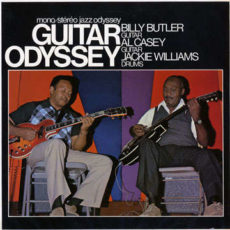
Daily Dose Of Jazz…
Jackie Williams was born on January 02, 1933 in Harlem, New York City, New York. Growing up in the fertile jazz atmosphere of the city, he also absorbed the dance grooves of rhythm and blues. Citing Papa Joe Jones as one of his greatest influences, by the mid 1950s he was playing for dancers and soon became a first call musician for recording sessions. He is a recipient of Yale University’s Duke Ellington Fellowship Medal
For 18 years Jackie played with Doc Cheatham at Greenwich Village’s Sweet Basil and performed and recorded with Buck Clayton on a U.S. State Department tour of the Middle East and Africa. He has also been a sideman with Bobby Hackett, Illinois Jacquet, Earl Hines, Duke Ellington, Alberta Hunter, Buddy Tate, Billy Butler, Al Casey, Stéphane Grappelli, Johnny Guarnieri, Jimmy Shirley, Buddy Tate, Slam Stewart, Barbara Morrison, Milt Hinton, Dizzy Gillespie, Maxine Sullivan, Vic Dickenson, Jay McShann, Bobby Short, Teddy Wilson and Errol Garner to name a few.
At one time or another during his career Williams was a member of The Cliff Smalls Septet, The Dan Barrett Octet, The Howard Alden / Dan Barrett Quintet, Warren Vaché Quartet, Warren Vaché, Jr. And His All-Stars, Statesmen of Jazz, The Floating Jazz Festival Trio and many others.
Drummer Jackie Williams is currently a member of the Junior Mance Trio.
Sponsored By
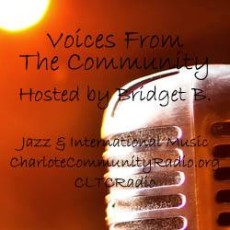
Voices From The Community
![]()
#preserving genius
More Posts: drums
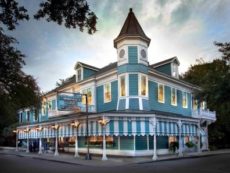
The Jazz Voyager
The Commander’s Palace is the destination at the end of this jazz voyager’s road trip and navigating through the Garden District in New Orleans, Louisiana for the jazz brunch fit for royalty. The restaurant is located at 1403 Washington Ave, 70130 / 504-899-8221 / $$$ / Brunch: 10:30am – 1:30pm
This former 1920s bordello turned restaurant is run by the Brennan family and housed in a bright blue Victorian mansion, built in 1880. They have been serving up refined Creole fare in a chandelier-hung space, and it is an elegant way to leisurely spend a late morning-early afternoon listening to jazz while dining.
Insider Tip: In the summer, the restaurant sells off inventory from their wine cellar at half price. There’s one catch: You have to mention the phrase “GrapeNutes” when making a reservation, then you’ll receive the discounted wine list.
Reservations are recommended and no shorts or t-shirts are allowed. Jackets are required on Sundays. To discover menu offerings visit commanderspalace.com #preserving genius
Sponsored By
www.whatissuitetabu.com
![]()



